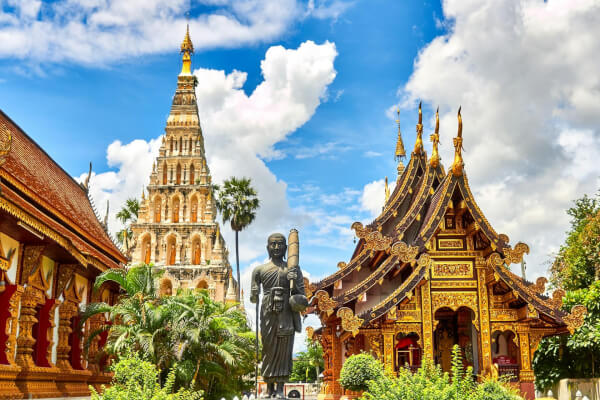Can I use my Barclaycard in Thailand?
Can I use my Barclaycard in Thailand? Find out here in this handy guide, including fees for using your credit card in Thailand.

Key takeaways:
Planning the trip of a lifetime to Thailand? We’re here to help, with a handy guide for UK travellers covering everything you need to know. This includes info on visas and entry requirements, health and safety essentials, money and currency, laws and customs, and much more.
We’ll also show you a convenient and cost-effective way to spend in Thailand – the Wise debit card. It’s designed for low-cost spending in 150+ countries. This clever international debit card automatically converts your pounds to Thai baht (THB) whenever you spend, for low, transparent fees* and mid-market exchange rates.
Learn more about the Wise debit card 💳
Let’s start with a look at visas and entry requirements for Thailand for UK nationals - essential to know before you book your flights and accommodation.
The good news is that you don’t need to apply for a visa in advance to visit Thailand as a tourist from the UK. You can stay for up to 60 days without a visa, with the possibility to extend for another 30 days if needed.¹
During this period, you’re also permitted to do urgent or ad-hoc work, or carry out business engagements.¹ For any other activities though or to stay in the country for longer, you’ll need to apply for a visa.
You’ll also need to make sure your passport is valid for at least 6 months after the date you plan to leave Thailand. And you’ll need to have at least 1 blank page in it.¹
Many parts of Thailand are generally considered to be safe for tourists and foreign visitors, provided you take sensible precautions to ensure your safety. We’ll cover some safety tips, including emergency contact information, later in this guide.
However, the UK Government’s Foreign, Commonwealth and Development Office (FCDO) does warn against travel to the following regions:²
Flight times from the UK to Thailand vary depending where you’re travelling to and from in both countries.
But to give you an idea, the flight time between London Heathrow and Bangkok in Thailand is around 12 hours (direct).³
It’s always a sensible idea to read up on health information before visiting a foreign country. The last thing you want is for your dream holiday to be ruined by illness, or to be turned away at the border because you don’t have the required vaccinations.
According to Travel Health Pro, travellers to Thailand should ensure they are up-to-date with all the usual recommended UK vaccinations. This includes the measles-mumps-rubella (MMR) vaccine and diphtheria-tetanus-polio vaccine.⁴
Vaccinations for tetanus and hepatitis A are also recommended. If you’re travelling from a country with a yellow fever risk (this doesn’t include the UK), then you’ll also need a certificate of yellow fever vaccination.⁴
There is a low risk of malaria and dengue in parts of Thailand, so you should take all preventative measures possible to avoid mosquito bites. And make sure you’re aware of the symptoms of both illnesses.⁴
Here are some additional health tips to bear in mind when travelling to Thailand:

We’ve looked at health advice for Thailand, but it’s also important to think about how you’ll stay safe during your trip.
Here are some tips to remember:⁵
If you experience an emergency situation during your trip, here are the numbers to call:⁶
Make sure you have the number of your travel insurance provider too, in case you need to make a claim or seek assistance.
If you’re planning on travelling around the city you’re visiting or even different parts of the country, it’s useful to know about Thailand’s public transport system.
Within cities, you’ll have a choice of buses, tuk-tuks, motorbike taxis and shared taxis called Songthaews. In Bangkok, you can also take the MRT Subway or the BTS Skytrain - the city’s overground railway system.
And for travel between towns and cities, buses and trains are the most common means of transport.
Want to get out of the city and explore some of Thailand’s famously beautiful beaches, bays and wild natural landscapes? You might need to hire a car.
You’ll need to be at least 21 years old to hire a car, although some hire companies have a lower minimum driver age of 20 years old.⁷
You’ll also need an International Driving Permit (IDP).⁷ A UK driving licence will not be sufficient on its own, so you’ll need to apply for an IDP before your trip. You can get one from certain UK shops that have PayPoint for a cost of £5.50.⁸
Before setting off, you’ll need to make sure you know the rules of the road in Thailand. Helpfully, vehicles drive on the left there - just like in the UK.
It’s always recommended to brush up on local rules, laws and customs in the country you’re visiting. Thai culture is quite different to what you’re used to in the UK, as are the country’s rules and laws.
Here are some important things you need to know:⁵
Tipping isn’t widespread or expected in Thailand, as a service charge is often included in the bill. However, leaving a small amount or rounding up the total may be appreciated.
The main language spoken in Thailand is Thai, but many people also speak English - especially in major cities and tourist areas.
Other languages spoken in Thailand include Chinese, Burmese, Malay, Lao, Vietnamese and Cambodian.⁹
Now, you’ll need to know the best way to spend while in Thailand, as well as how to manage and convert your money.
The first crucial thing to know is the official currency, which is the Thai baht (THB).
The symbol for it is ฿.
You can change your British pounds for Thai baht here in the UK, or when you arrive. Just make sure to get the best exchange rate and watch out for fees/commission, to make sure you’re getting a good deal.
It’s usually best to avoid changing currency in airports or hotels, as they are notorious for offering very poor deals in exchange for the convenience they offer.
Spending on a debit or credit card is also an option - you’ll just need to check whether your bank or card provider charges fees for spending in foreign currencies.
Thailand is quite cash-centric, although cards are accepted in larger hotels, shops and businesses located in major cities and tourist areas. So, it’s a good idea to have a mix of cash and cards with you, so you’ll have all bases covered.
You’ll find plenty of ATMs in Thailand, usually located in shopping centres, main streets, central plazas and outside Thai banks. And most ATMs should accept international cards along with locally-issued ones.
| 💡 Read more: Money in Thailand: Banks, ATMs, cards & currency exchange |
|---|
Open a Wise account online and you can order the Wise debit card for a one-time fee of £7. You can use this clever card in 150+ countries, including Thailand. It automatically converts your pounds to local currency whenever you spend using the mid-market exchange rate, only adding a tiny, transparent conversion fee* – or it’s free if you already have the local currency in your Wise account.
You also get two free ATM withdrawals for up to 200 GBP (or currency equivalent) each month. Wise will not charge you for these withdrawals, but additional charges may occur from independent ATM networks.
And that’s about it - everything you need to know about travelling to Thailand from the UK.
We’ve looked at all the essentials, including visas and entry requirements, health and safety, transport, money, currency and language.
You should be all set to pack your suitcase and have an amazing trip. Bon voyage!
Sources used:
Sources last checked on date: 28-Mar-2025
*Please see terms of use and product availability for your region or visit Wise fees and pricing for the most up to date pricing and fee information.
This publication is provided for general information purposes and does not constitute legal, tax or other professional advice from Wise Payments Limited or its subsidiaries and its affiliates, and it is not intended as a substitute for obtaining advice from a financial advisor or any other professional.
We make no representations, warranties or guarantees, whether expressed or implied, that the content in the publication is accurate, complete or up to date.

Can I use my Barclaycard in Thailand? Find out here in this handy guide, including fees for using your credit card in Thailand.

Read our guide on the best travel card for Thailand, including card comparisons and travel tips.

Learn how to claim your VAT refund in Thailand with our comprehensive guide, perfect for UK travellers. Discover the VAT refund process to maximise your savings

Can I use my Starling card in Thailand? Find out everything you need to know about using Starling Bank overseas in our handy guide.

Should you pay with cash or card in Thailand? Explore our helpful guide on Thai currency, cash etiquette, ATMs and using your UK card.

Check out our in-depth guide on everything you need to know about buying a prepaid SIM card for Thailand, including different providers, pricing, and features.